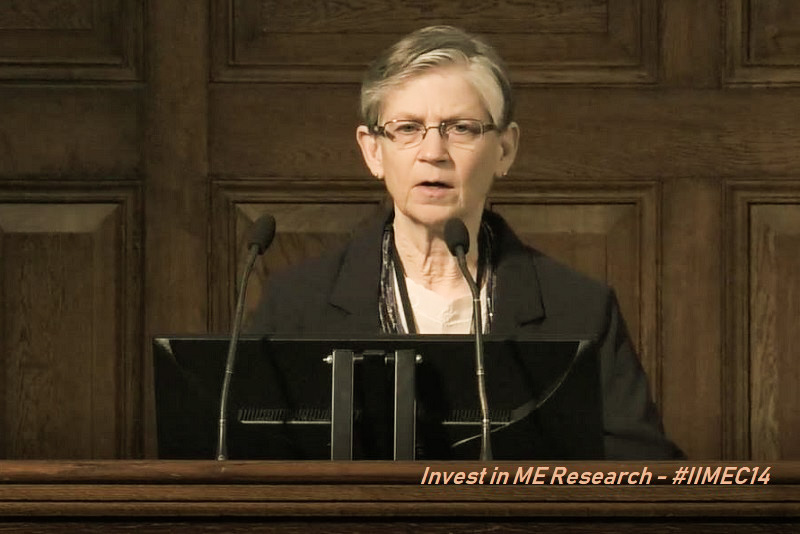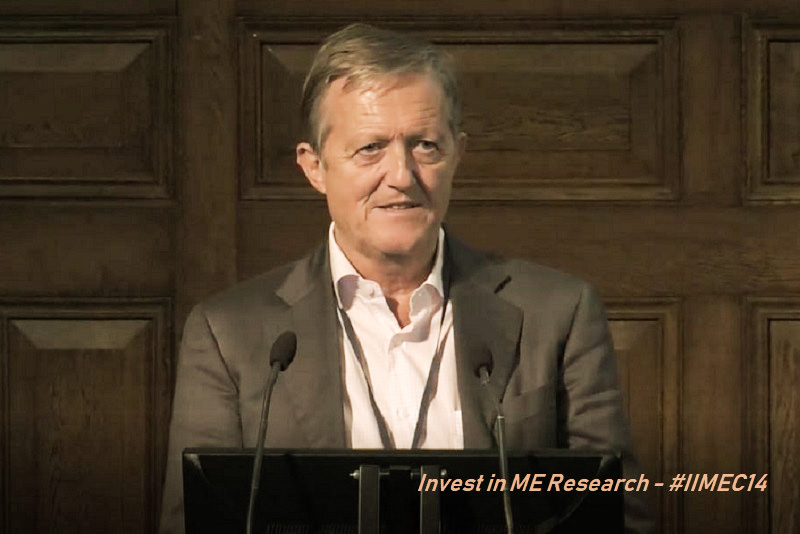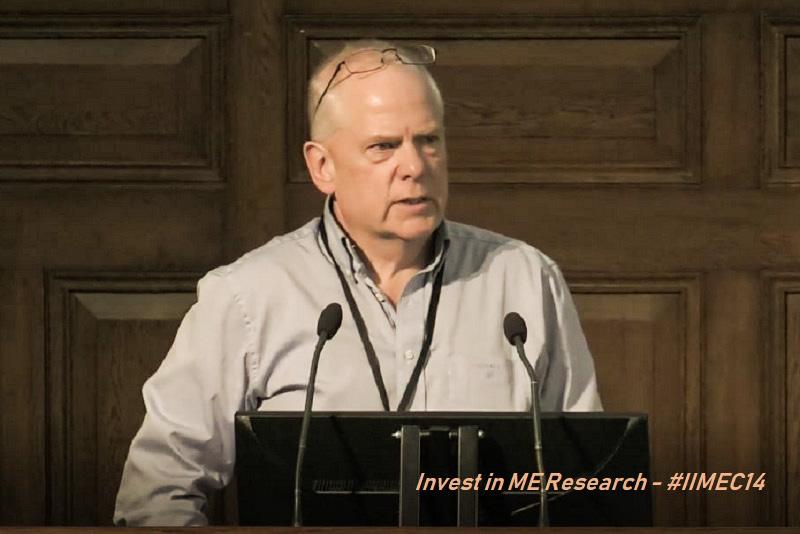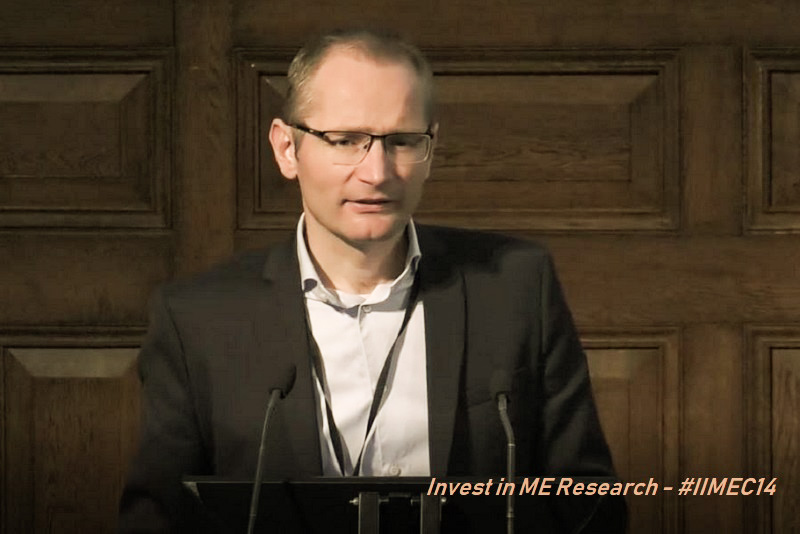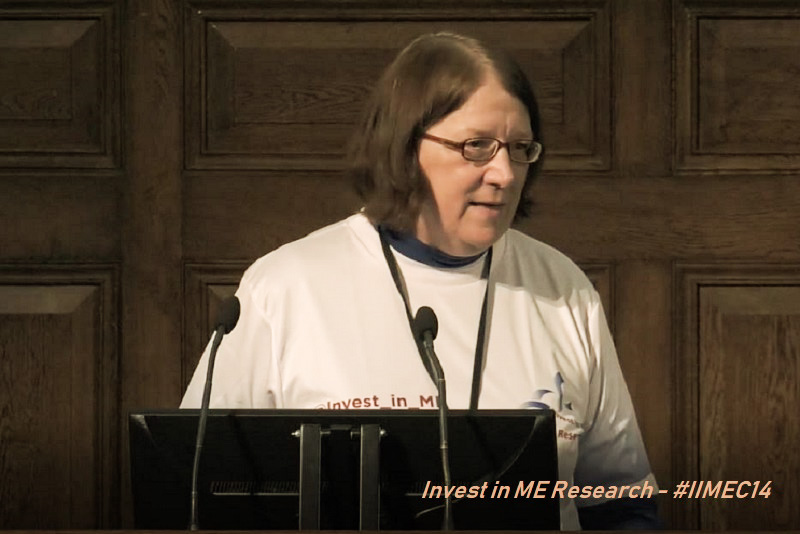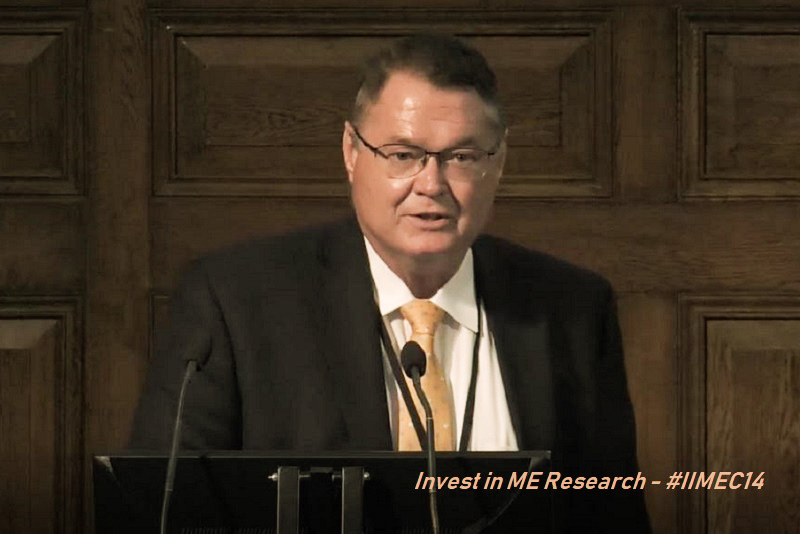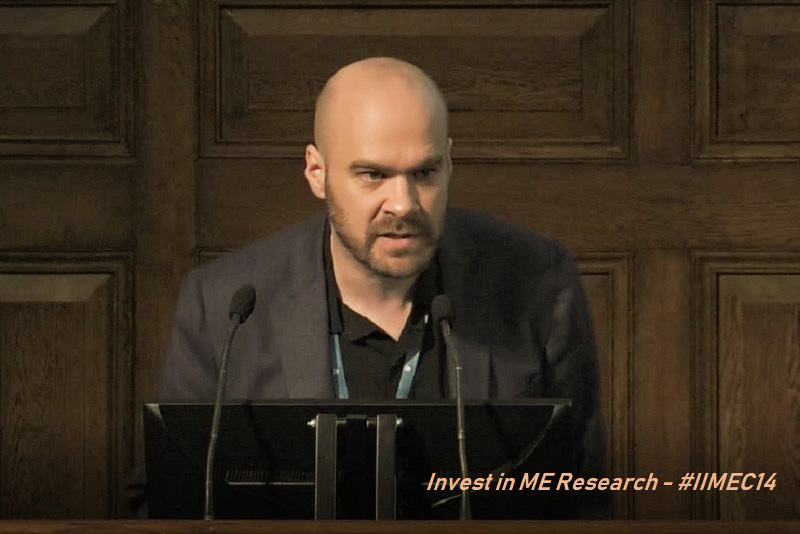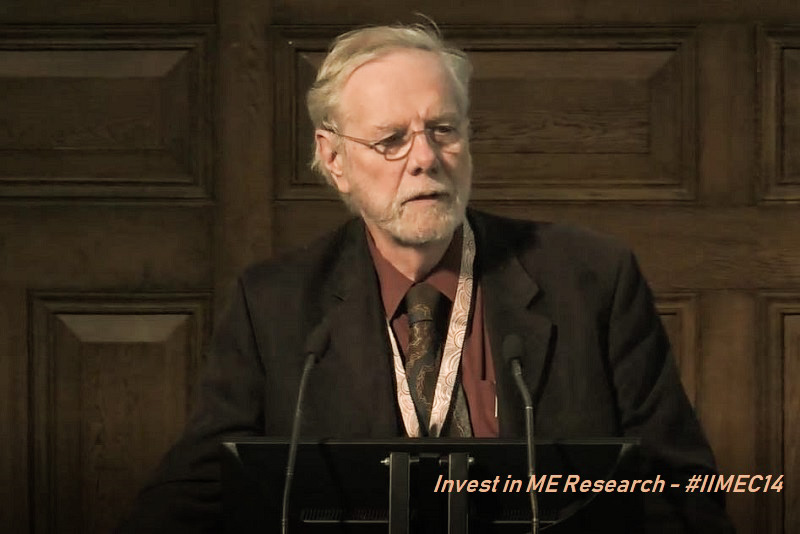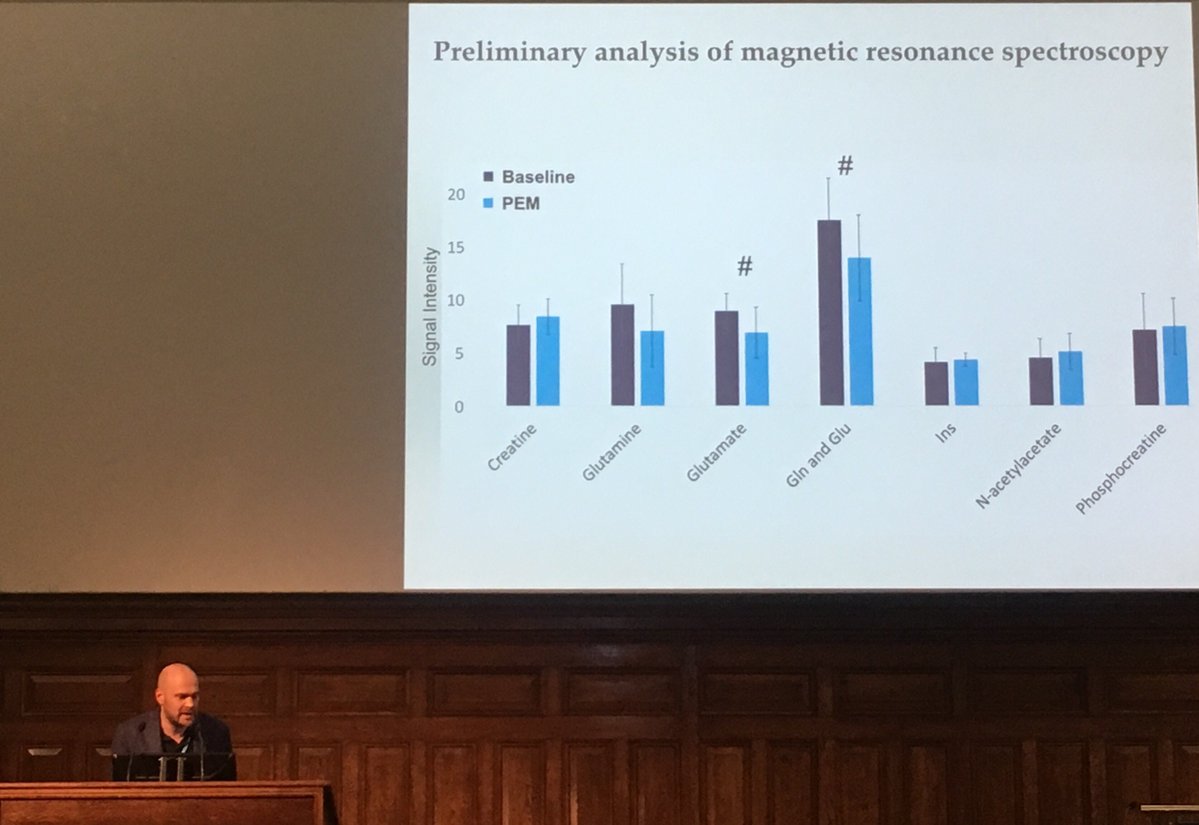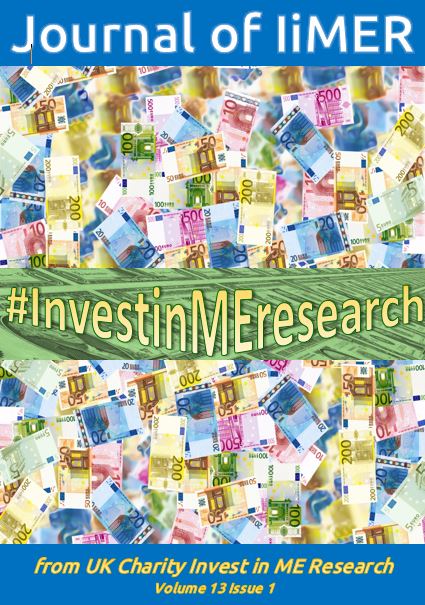
Invest in ME Research International ME Conference 2019
Fourteen years of Commitment to Biomedical Research into ME
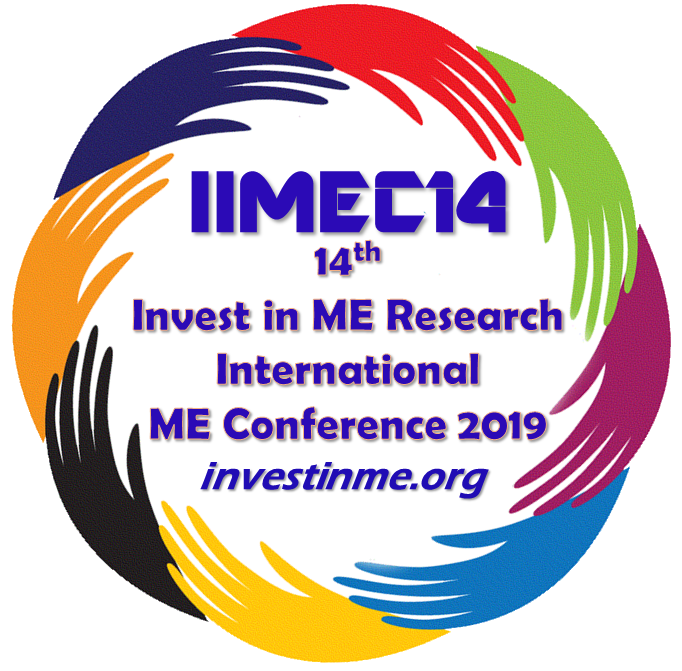
Click on sections below
Conference Presentations from IIMEC14

IIMEC14 Pre-Conference Dinner Presentation
Dr Ian GibsonFormer Dean of Biological Sciences, UEA
Dr Ian Gibson was the former Labour MP for Norwich North. Dr Gibson worked at University of East Anglia for 32 years,
became Dean of the School of Biological Sciences at UEA in 1991
and was head of a cancer research team and set up the Francesca Gunn Leukaemia Laboratory at UEA.
In 2011 Dr Gibson received an honorary doctorate of civil law from UEA.
A scientist, politician and academic - Dr.Ian Gibson was uniquely qualified to comment on how science and politics have become intertwined.
Other Links
-
References
Opening of 14th International ME Conference - IIMEC14
Dr Ian Gibson#InvestinMEresearch
Former Dean of Biological Sciences, UEA
Dr Ian Gibson was the former Labour MP for Norwich North. Dr Gibson worked at University of East Anglia for 32 years,
became Dean of the School of Biological Sciences at UEA in 1991
and was head of a cancer research team and set up the Francesca Gunn Leukaemia Laboratory at UEA.
In 2011 Dr Gibson received an honorary doctorate of civil law from UEA.
A scientist, politician and academic - Dr.Ian Gibson was uniquely qualified to comment on how science and politics have become intertwined.
Other Links
-
References
ME Research Update at Centres for Disease Control, USA
Dr Elizabeth R. UngerChief of Chronic Viral Diseases Branch, National Center for Emerging and Zoonotic Infectious Diseases, Centers for Disease Control and Prevention
Elizabeth (Beth) Unger, PhD, MD, received an undergraduate degree in Chemistry at Lebanon Valley College, Annville, PA. She then earned her PhD and MD in the Division of Biologic Sciences at the University of Chicago where she also began a residency in pathology. Her residency and fellowship was completed at Pennsylvania State University Medical Center. During this time, Dr. Unger developed a practical method of colorimetic in situ hybridization. This work led to interest in tissue localization of HPV and ultimately to her initial appointment to CDC in 1997 to pursue molecular pathology of HPV and CFS.
Dr. Unger has served as the Acting Chief of CVDB since January 2010 and has 13 years of experience in CVDB, where she has participated in the design and implementation of CFS research and HPV laboratory diagnostics. During this time, she was co-author on 25 peer-reviewed manuscripts related to CFS, including the often-cited descriptions of the Wichita and Georgia population-based studies. In addition, Dr. Unger has been instrumental in efforts by WHO to establish an HPV LabNet and serves as lead of a WHO HPV Global Reference Laboratory. She is co-author of 142 peer-reviewed publications and 24 book chapters and serves on the editorial board of six scientific journals. In 2008, for her HPV research accomplishments, she received the Health and Human Services (HHS) Career Achievement Award.
Dr Unger has been selected to serve as the Chief of the Chronic Viral Diseases Branch (CVDB) in the Division of High-Consequence Pathogens and Pathology (DHCPP), National Center for Emerging and Zoonotic Infectious Diseases (NCEZID), Centers for Disease Control and Prevention (CDC).
-
References
ME Research Update at National Institutes of Health, USA
Dr Vicky WhittemoreProgram Director in the National Institute of Neurological Disorders and Stroke at the National Institutes of Health in the United States.
Dr. Whittemore is a Program Director in the Synapses, Channels and Neural Circuits Cluster. Her interest is in understanding the underlying mechanisms of the epilepsies including the study of genetic and animal models of the epilepsies.
The major goal is to identify effective treatments for the epilepsies and to develop preventions. Dr. Whittemore received a Ph.D. in anatomy from the University of Minnesota, followed by post-doctoral work at the University of California, Irvine, and a Fogarty Fellowship at the Karolinska Institute in Stockholm, Sweden.
She was on the faculty of the University of Miami School of Medicine in The Miami Project to Cure Paralysis prior to working with several non-profit organizations including the Tuberous Sclerosis Alliance, Genetic Alliance, Citizens United for Research in Epilepsy (CURE), and the National Coalition for Health Professional Education in Genetics (NCHPEG).
She also completed a four-year term on the National Advisory Neurological Disorders and Stroke Council.
Dr. Whittemore oversees a grant portfolio that includes basic, translational and clinical studies on epilepsy. These include grants on sudden unexpected death in epilepsy (SUDEP), the genetic epilepsies, and seizure localization studies. In addition, she oversees a grant portfolio on myalgic encephalomyelitis/chronic fatigue syndrome (ME/CFS) and fatigue. Her additional interests are in research on global health issues, stigma, and co-morbidities.
-
References
Immune Dysregulation in ME/CFS
Professor Maureen HansonLiberty Hyde Bailey Professor, Department of Molecular Biology and Genetics, Cornell University, New York, USA
Department of Molecular Biology and Genetics, Cornell
Maureen Hanson is Liberty Hyde Bailey Professor in the Department of Molecular Biology and Genetics at Cornell University in Ithaca, NY.
Previously she was on the faculty of the Department of Biology at the University of Virginia in Charlottesville and an NIH NRSA postdoctoral fellow at
Harvard, where she also completed her Ph.D. degree.
While most of her prior research has concerned cell and molecular biology in plant cells, she began a research program on ME/CFS after noting at a
2007 IACFS meeting the paucity of molecular biologists studying the illness.
Her lab was part of the 2012 multicenter study organized by Ian Lipkin's group at Columbia University to assess the actual role of XMRV in ME/CFS.
Associate Professor Mady Hornig
Associate Professor of Epidemiology, Columbia University Mailman School of Public Health
Mady Hornig, MA, MD did her undergraduate studies as a College Scholar at Cornell, received an MA in Psychology from The New School for Social Research and an MD from The Medical College of Pennsylvania and completed her residency in psychiatry at The Medical Center Hospital of Vermont and an NIMH/NRSA Neuropsychopharmacology Fellowship at the University of Pennsylvania. Her research leverages large epidemiologic cohorts, novel bench science and animal model studies to determine how microbial, immune and toxic exposures impact upon the brain across the life course, resulting in disorders such as autism, attention-deficit/hyperactivity disorder (ADHD), Pediatric Autoimmune Neuropsychiatric Disorders Associated with Streptococcal infection (PANDAS), mood disorders, schizophrenia, myalgic encephalomyelitis/chronic fatigue syndrome (ME/CFS) and age-related cognitive deficits.
Dr. Hornig is internationally known for her work in the growing research arena exploring the mechanisms of gut-immune-brain axis functioning, seeking clues to both the understanding of the roots of dysfunction as well as uncovering pathways that strengthen individual resiliency. She has a keen interest in how diet, exercise and environmental factors affect each individual’s intestinal bacteria – the so-called gut microbiome – which then influences brain function through alterations in blood-borne molecules.
She has identified naturally-occurring substances that appear to strengthen resistance to certain disease states affecting the brain, and is pursuing these as candidates for prevention and intervention in ME/CFS and autism. She uses immune profiling, metabolomic, proteomic, epigenetic and microbiome approaches to identify prenatal and birth biomarkers for brain disorders in large prospective studies in Scandinavia as well as the US. She is also applying these approaches to uncover markers of disturbed immunity and metabolism correlating with the severe clinical deficits that underlie ME/CFS, work launched with support from the Hutchins Family Foundation/Chronic Fatigue Initiative, the National Institutes of Health and the crowd-funding initiative, The Microbe Discovery Project. Perhaps most exciting is that new ME/CFS subsets that appear to have different triggers and may respond differentially to treatment are now being identified through her work.
Dr. Hornig’s approach is enriched by her unusual combination of decades of experience as a clinical researcher, her acumen in defining novel neuropharmacological and nutritional approaches for brain disorders and her ability to carefully tease out factors that enhance resiliency to disease.
In 2004, Dr. Hornig presented to the Institute of Medicine Immunization Safety Review Committee and testified twice before congressional subcommittees regarding the role of infections and toxins in autism pathogenesis and has lectured on ME/CFS throughout the world. She has over 120 peer-reviewed publications, has edited several books, and has received many academic awards. Her work has been featured by the New York Times, the Los Angeles Times, The Washington Post, The Wall Street Journal, The Atlantic, Discover Magazine, Nature Medicine, Science, Wired, the Huffington Post, O Magazine, CBS News, and This Week in Virology.
-
References
Transient receptor potential ion channels in the aetiology and pathomechanism of CFS/ME
Professor Don StainesThe National Centre for Neuroimmunology and Emerging Diseases (NCNED), Griffiths University, Australia
Professor Staines has been a public health physician at Gold Coast Population Health Unit.
He has worked in health services management and public health practice in Australia and overseas.
His interests include collaborative health initiatives with other countries as well as cross-disciplinary initiatives within health. Communicable diseases as well as post infectious fatigue syndromes are his main research interests.
A keen supporter of the Griffith University Medical School, he enjoys teaching and other opportunities to promote awareness of public health in the medical curriculum. He is now Co-Director at The National Centre for Neuroimmunology and Emerging Diseases (NCNED), Griffiths University in Australia
Pathophysiological Basis of Fibromyalgia
Dr David AnderssonWolfson Centre for Age-Related Diseases, Kings College London, UK
David Andersson has been at the Wolfson Centre for Age-Related Diseases in London since 2011. Research in David Andersson’s laboratory is centred on sensory transduction mechanisms
.-
References
Characteristics and Pathophysiological Changes in a Large Cohort of Danish ME-patients
Dr Jesper MehlsenKlinik Mehlsen, Frederiksberg, Denmark
Dr Jesper Mehlsen graduated as a medical doctor in 1979 and finished his specialist training in 1990.
He has published more than 140 scientific papers in peer reviewed journals, mainly on the autonomic nervous system and more recently
on complex diseases possibly resulting form HPV-vaccination.
For more than 35 years, he has worked clinically and in research with dysfunction of the autonomic nervous system.
Such dysfunction may lead to symptoms from a number of different organs often dominated by diminished control of blood pressure
and heart rate.
Over the past 5 years, he has worked clinically and in research with patients who suspect side effects due to HPV vaccination to
be the cause of a number of symptoms, common to those seen in chronic ME.
Dr Mehlsen is co-chair of the European ME Research Group (EMERG).
-
References
The Anne Örtegren Memorial Lecture 2019
Remembering the influence of Anne Örtegren
Professor Stuart Bevan
Professor of Pharmacology at the Wolfson Centre for Age Related Disease, Kings College London, UK
Professor Stuart Bevan
Professor Stuart Bevan is Professor of Pharmacology at the Wolfson Centre for Age Related Diseases.From 1997 to 2005, he was Head of the Chronic Pain Unit for Novartis based in the Novartis Institute for Biomedical Research laboratories on the UCL campus.
References
-
Anne Örtegren
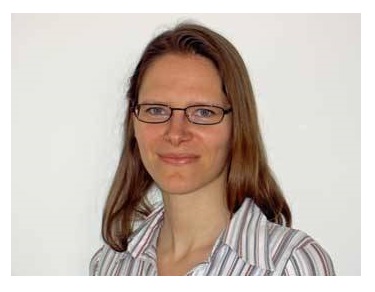
ME Research Developments at Quadram Institute
Professor Simon CardingResearch Leader, Quadram Institute Bioscience, Norwich Research Park, UK
Upon completing postgraduate work at the Medical Research Council’s Clinical Research Centre in Harrow, Professor Carding “emigrated” to the USA to take up a postdoctoral position at New York University School of Medicine, and then at Yale University as a Howard Hughes Fellow in the Immunobiology Group at Yale University with Profs Kim Bottomly and Charlie Janeway Jr. While at Yale an interest in gamma-delta (γδ) T cells was acquired working closely with Adrian Hayday on molecular genetics and then with Prof. Peter Doherty to establish their role in (viral) infectious disease.
He left Yale after five years to take up a faculty position at the University of Pennsylvania in Philadelphia where he developed a research interest in mucosal and GI-tract immunology, performing studies in germfree mice with Prof John Cebra that helped establish the role of gut microbes in the aetiology of inflammatory bowel disease (IBD).
After 15 years in the USA, he returned to the UK to take up the Chair in Molecular Immunology at the University of Leeds where he established a new research programme on commensal gut bacteria and Bacteroides genetics leading to the development of a Bacteroides drug delivery platform that is being used for developing new interventions for IBD and for mucosal vaccination.
In 2008 he was recruited by UEA and IFR to develop a gut research programme, taking up the Chair of Mucosal Immunology at UEA-MED and the position of head of the Gut Biology Research Programme at IFR, which later became part of the Gut Health and Food Safety (GHFS) Programme.
GHFS research covers a broad area of gut biology including epithelial cell physiology, mucus and glycobiology, mucosal immunology, commensal microbiology, foodborne bacterial pathogens, and mathematical modelling and bioinformatics. The success of this programme has led to the establishment of the Gut Microbes and Health research programme that is integral to the research agenda of The Quadram Institute.
-
References
Professor Øystein Fluge
Haukeland University Hospital, Bergen, Norway
Øystein Fluge received medical degree in 1988 at the University of Bergen, and is a specialist in oncology since 2004.
He has worked as a Research Fellow with support from the Norwegian Cancer Society and is now chief physician at the Cancer Department, Haukeland University Hospital.
Doctoral work emanates from the Surgical Institute and Department of Molecular Biology, University of Bergen.
.-
References
Metabolic profiling and associations to clinical data in ME
Professor Karl Johan TronstadProfessor Institute for Biomedicine , Tronstad Lab, Bergen, Norway
Professor Tronstad completed his graduate studies in biochemistry at the University of Bergen (UiB) in 2002. As postdoc at the Haukeland University Hospital, he studied bioactive compounds with the potential to modulate mitochondrial functions in cancer cells. In 2005 he was recruited to the Department of Biomedicine, UiB, where he started his research group to investigate metabolism and mitochondrial physiology. His laboratory seeks to better our understanding of how defective mitochondrial homeostasis may disturb cell physiology, and how this may be involved in mechanisms of cancer and Myalgic Encephalomyelitis/Chronic Fatigue Syndrome (ME/CFS).
Karl was involved with the recent paper to come from Bergen - Journal of Clinical Investigation Insight.
The Tronstad Lab investigates cell metabolism and mitochondrial biology and we are very fortunate that he can spare time to participate in the Colloquium.
Specialisms:
Metabolism, Cell biology, Mitochondria, Biochemistry
-
References
Integrative Medicine Approach to Treatment of ME
Professor Nancy KlimasDirector, Institute for Neuro Immune Medicine, Nova Southeastern University
Director, Clinical Immunology Research, Miami VAMC
Professor of Medicine, Department of Clinical Immunology, College of Osteopathic Medicine, Nova Southeastern University
Chair, Department of Clinical Immunology, College of Osteopathic Medicine, Nova Southeastern University
Professor Emerita, University of Miami, School of Medicine
Nancy Klimas, MD, has more than 30 years of professional experience and has achieved international recognition for her research and clinical efforts in multi-symptom disorders, Myalgic Encephalomyelitis/Chronic Fatigue Syndrome (ME/CFS), Gulf War Illness (GWI), Fibromyalgia, and other Neuro Immune Disorders. She is immediate past president of the International Association for CFS and ME (IACFS/ME), a professional organization of clinicians and investigators, and is also a member of the VA Research Advisory Committee for GWI, the NIH P2P CFS Committee, and the Institute of Medicine ME/CFS Review Panel. Dr. Klimas has advised three Secretaries of Health and Human Services, including Kathleen Sabelius, during her repeated service on the Health and Human Services CFS Advisory Committee. Dr. Klimas has been featured on Good Morning America, in USA Today and the New York Times.
.-
References
Harvard Plans for Clinical Research into ME/CFS
Dr Ron TompkinsDirector of the Center for Surgery, Science and Bioengineering, Massachusetts General Hospital
BRIEF BIOGRAPHY
Ronald G. Tompkins, MD, ScD, is the Sumner M. Redstone Professor of Surgery at Harvard Medical School, Founding Director of the Center for Surgery, Science & Bioengineering at Massachusetts General Hospital, and Chief of Staff Emeritus at Shriners Hospitals for Children―Boston.
The Center, a division of Surgery at Mass General, is a newly established center for research and innovation based upon the Mass General Burns Division’s collaborative track record and expertise in securing more than $200 million in federal, foundation, and industrial support for basic research and clinical programs.
It is a clinically-driven enterprise that engages in the basic sciences and engineering to solve everyday challenges in clinical medicine. The center promotes the development of new approaches to healthcare delivery and personalized medicine, minimally invasive therapies, as well as a myriad of new technologies such as re-engineered organs, smart nano-pharmaceuticals and nano-diagnostics, and living cell-based microfabricated devices for diagnostics, therapeutics, high-throughput drug screening, and basic and applied biomedical investigation.
He is a board-certified general surgeon with a doctorate in chemical engineering, which provides him with expertise not only in the clinical evaluation of critical care patients, but also in inflammation biology, genomics, proteomics, and computational biology.
Elected as a Director of the American Board of Surgery in 1994, he has received multiple honors including a fellowship from the American Institute for Medical and Biological Engineering and an honorary M.A. from Harvard University. He has served as an officer including as President and Board Member of more than a dozen national and international academic societies. RESEARCH SUMMARY
Dr. Tompkins has published more than 450 research papers in medicine and engineering journals and has contributed to the advancement of science and engineering through service on institutional advisory panels, moderating mini-symposia and workshops on biotechnology, and studying the genomics and proteomics of immunology and metabolism resulting from injury.
Together with his Division colleagues, nearly 300 fellows have been mentored in the Division’s training programs with many excellent success stories.
.-
References
Dr Michael VanElzakker
Neuroscientist, Massachusetts General Hospital/Tufts University, USA
Dr. VanElzakker received a master's degree in behavioral neuroscience at the University of Colorado, working in Dr. Robert Spencer's neuroendocrinology laboratory, and a PhD in experimental clinical psychology at Tufts University, working in Dr. Lisa Shin's psychopathology neuroimaging laboratory. His postdoctoral fellowship is at Massachusetts General Hospital/ Harvard Medical School, at the Martinos Center for Biomedical Imaging, in the Division of Neurotherapeutics.
Dr. VanElzakker is interested in uncovering the mechanisms of post-traumatic stress disorder (PTSD), and of myalgic encephalomyelitis - also known as chronic fatigue syndrome (ME/CFS).
His PTSD research uses functional and structural brain imaging, behavioral attention tasks, blood, and genetic data to investigate what makes some individuals vulnerable to PTSD following trauma. He is interested in using non-invasive electroceutical medical devices to enhance safety learning, which may eventually serve as an adjunct to enhance exposure-based therapy for PTSD.
His ME/CFS research uses functional and structural brain imaging to look for abnormal patterns in brain metabolism and inflammation in this patient population. This research focuses on dysfunction at the intersection of the nervous and immune systems and posits that ME/CFS may be what happens when the nervous system detects an exaggerated and ongoing innate immune response. He is interested in using non-invasive electroceutical medical devices to enhance the anti-inflammatory vagus nerve reflex.
From The Center for Surgery, Innovation & Bioengineering
.-
References
Professor Ronald Davis
Professor of Biochemistry and Genetics at the Stanford School of Medicine in Stanford, California, USA
Ronald W. Davis, Ph.D., is a Professor of Biochemistry and Genetics at the Stanford School of Medicine in Stanford, California.
He is a world leader in the development of biotechnology, especially the development of recombinant DNA and genomic methodologies and their application to biological systems.
At Stanford University, where he is Director of the Stanford Genome Technology Center, Dr. Davis focuses on the interface of nano-fabricated solid state devices and biological systems.
He and his research team also develop novel technologies for the genetic, genomic, and molecular analysis of a wide range of model organisms as well as humans.
The team's focus on practical application of these technologies is setting the standard for clinical genomics.
.-
References
IIMEC14 PLENARY SESSION
At the end of the conference more questions were taken by the final three speakers. .
We hope that you have enjoyed the conference videos.
Invest in ME Research is a charity of volunteers attempting to make progress in research into ME

We welcome support to enable us to continue our efforts.
-
IiMER Links
IIMEC14 Pre-Conference Dinner Speech

IIMEC14 Pre-Conference Dinner Speech from Dr Ian Gibson
BRMEC9 - International Research Colloquium, London 2019
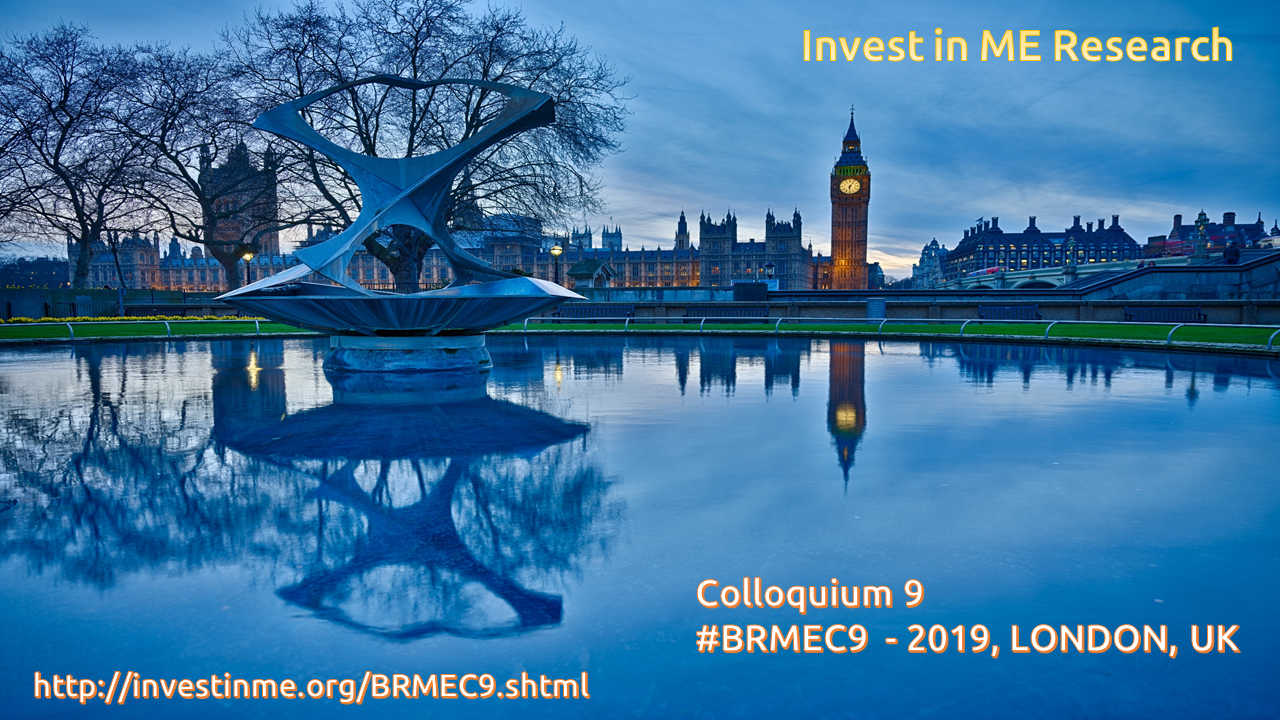
Invest in ME Research organised and hosted the Biomedical Research
into ME Colloquium number 9 in May 2019.
Almost 100 researchers from fourteen countries attended the two-day meeting.
The collaborative atmosphere and resulting collaborations from the
Colloquium will help further progress research and ultimately help patients.
Use this
link to go to the BRMEC Colloquium page.
Our Sponsors for IIMEC14
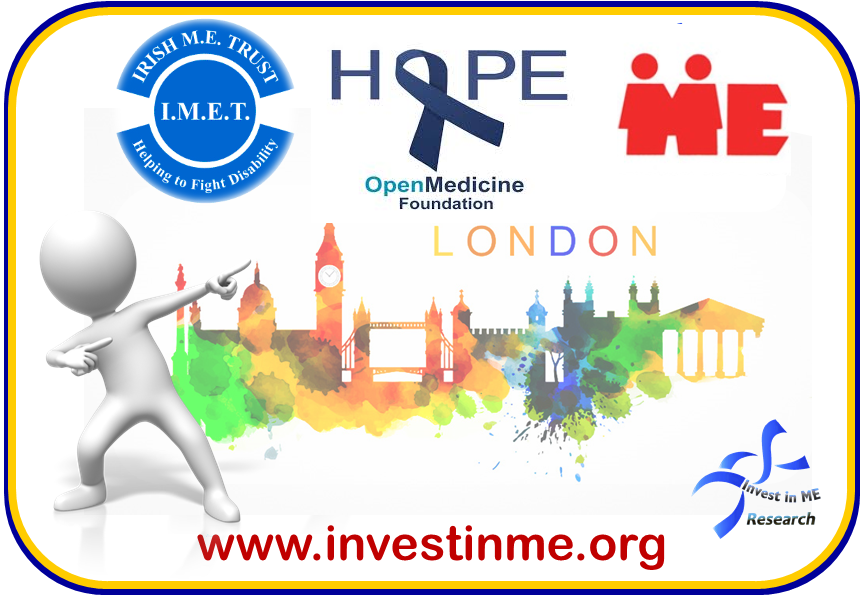
IIMEC14 Pre-Conference Dinner Presentation
Dr Ian GibsonFormer Dean of Biological Sciences, UEA
Dr Ian Gibson was the former Labour MP for Norwich North. Dr Gibson worked at University of East Anglia for 32 years,
became Dean of the School of Biological Sciences at UEA in 1991
and was head of a cancer research team and set up the Francesca Gunn Leukaemia Laboratory at UEA.
In 2011 Dr Gibson received an honorary doctorate of civil law from UEA.
A scientist, politician and academic - Dr.Ian Gibson was uniquely qualified to comment on how science and politics have become intertwined.
Other Links
-
References
Opening of 14th International ME Conference - IIMEC14
Dr Ian Gibson#InvestinMEresearch
Former Dean of Biological Sciences, UEA
Dr Ian Gibson was the former Labour MP for Norwich North. Dr Gibson worked at University of East Anglia for 32 years,
became Dean of the School of Biological Sciences at UEA in 1991
and was head of a cancer research team and set up the Francesca Gunn Leukaemia Laboratory at UEA.
In 2011 Dr Gibson received an honorary doctorate of civil law from UEA.
A scientist, politician and academic - Dr.Ian Gibson was uniquely qualified to comment on how science and politics have become intertwined.
Other Links
-
References
ME Research Update at Centres for Disease Control, USA
Dr Elizabeth R. UngerChief of Chronic Viral Diseases Branch, National Center for Emerging and Zoonotic Infectious Diseases, Centers for Disease Control and Prevention
Elizabeth (Beth) Unger, PhD, MD, received an undergraduate degree in Chemistry at Lebanon Valley College, Annville, PA. She then earned her PhD and MD in the Division of Biologic Sciences at the University of Chicago where she also began a residency in pathology. Her residency and fellowship was completed at Pennsylvania State University Medical Center. During this time, Dr. Unger developed a practical method of colorimetic in situ hybridization. This work led to interest in tissue localization of HPV and ultimately to her initial appointment to CDC in 1997 to pursue molecular pathology of HPV and CFS.
Dr. Unger has served as the Acting Chief of CVDB since January 2010 and has 13 years of experience in CVDB, where she has participated in the design and implementation of CFS research and HPV laboratory diagnostics. During this time, she was co-author on 25 peer-reviewed manuscripts related to CFS, including the often-cited descriptions of the Wichita and Georgia population-based studies. In addition, Dr. Unger has been instrumental in efforts by WHO to establish an HPV LabNet and serves as lead of a WHO HPV Global Reference Laboratory. She is co-author of 142 peer-reviewed publications and 24 book chapters and serves on the editorial board of six scientific journals. In 2008, for her HPV research accomplishments, she received the Health and Human Services (HHS) Career Achievement Award.
Dr Unger has been selected to serve as the Chief of the Chronic Viral Diseases Branch (CVDB) in the Division of High-Consequence Pathogens and Pathology (DHCPP), National Center for Emerging and Zoonotic Infectious Diseases (NCEZID), Centers for Disease Control and Prevention (CDC).
-
References
ME Research Update at National Institutes of Health, USA
Dr Vicky WhittemoreProgram Director in the National Institute of Neurological Disorders and Stroke at the National Institutes of Health in the United States.
Dr. Whittemore is a Program Director in the Synapses, Channels and Neural Circuits Cluster. Her interest is in understanding the underlying mechanisms of the epilepsies including the study of genetic and animal models of the epilepsies.
The major goal is to identify effective treatments for the epilepsies and to develop preventions. Dr. Whittemore received a Ph.D. in anatomy from the University of Minnesota, followed by post-doctoral work at the University of California, Irvine, and a Fogarty Fellowship at the Karolinska Institute in Stockholm, Sweden.
She was on the faculty of the University of Miami School of Medicine in The Miami Project to Cure Paralysis prior to working with several non-profit organizations including the Tuberous Sclerosis Alliance, Genetic Alliance, Citizens United for Research in Epilepsy (CURE), and the National Coalition for Health Professional Education in Genetics (NCHPEG).
She also completed a four-year term on the National Advisory Neurological Disorders and Stroke Council.
Dr. Whittemore oversees a grant portfolio that includes basic, translational and clinical studies on epilepsy. These include grants on sudden unexpected death in epilepsy (SUDEP), the genetic epilepsies, and seizure localization studies. In addition, she oversees a grant portfolio on myalgic encephalomyelitis/chronic fatigue syndrome (ME/CFS) and fatigue. Her additional interests are in research on global health issues, stigma, and co-morbidities.
-
References
Immune Dysregulation in ME/CFS
Professor Maureen HansonLiberty Hyde Bailey Professor, Department of Molecular Biology and Genetics, Cornell University, New York, USA
Department of Molecular Biology and Genetics, Cornell
Maureen Hanson is Liberty Hyde Bailey Professor in the Department of Molecular Biology and Genetics at Cornell University in Ithaca, NY.
Previously she was on the faculty of the Department of Biology at the University of Virginia in Charlottesville and an NIH NRSA postdoctoral fellow at
Harvard, where she also completed her Ph.D. degree.
While most of her prior research has concerned cell and molecular biology in plant cells, she began a research program on ME/CFS after noting at a
2007 IACFS meeting the paucity of molecular biologists studying the illness.
Her lab was part of the 2012 multicenter study organized by Ian Lipkin's group at Columbia University to assess the actual role of XMRV in ME/CFS.
Associate Professor Mady Hornig
Associate Professor of Epidemiology, Columbia University Mailman School of Public Health
Mady Hornig, MA, MD did her undergraduate studies as a College Scholar at Cornell, received an MA in Psychology from The New School for Social Research and an MD from The Medical College of Pennsylvania and completed her residency in psychiatry at The Medical Center Hospital of Vermont and an NIMH/NRSA Neuropsychopharmacology Fellowship at the University of Pennsylvania. Her research leverages large epidemiologic cohorts, novel bench science and animal model studies to determine how microbial, immune and toxic exposures impact upon the brain across the life course, resulting in disorders such as autism, attention-deficit/hyperactivity disorder (ADHD), Pediatric Autoimmune Neuropsychiatric Disorders Associated with Streptococcal infection (PANDAS), mood disorders, schizophrenia, myalgic encephalomyelitis/chronic fatigue syndrome (ME/CFS) and age-related cognitive deficits.
Dr. Hornig is internationally known for her work in the growing research arena exploring the mechanisms of gut-immune-brain axis functioning, seeking clues to both the understanding of the roots of dysfunction as well as uncovering pathways that strengthen individual resiliency. She has a keen interest in how diet, exercise and environmental factors affect each individual’s intestinal bacteria – the so-called gut microbiome – which then influences brain function through alterations in blood-borne molecules.
She has identified naturally-occurring substances that appear to strengthen resistance to certain disease states affecting the brain, and is pursuing these as candidates for prevention and intervention in ME/CFS and autism. She uses immune profiling, metabolomic, proteomic, epigenetic and microbiome approaches to identify prenatal and birth biomarkers for brain disorders in large prospective studies in Scandinavia as well as the US. She is also applying these approaches to uncover markers of disturbed immunity and metabolism correlating with the severe clinical deficits that underlie ME/CFS, work launched with support from the Hutchins Family Foundation/Chronic Fatigue Initiative, the National Institutes of Health and the crowd-funding initiative, The Microbe Discovery Project. Perhaps most exciting is that new ME/CFS subsets that appear to have different triggers and may respond differentially to treatment are now being identified through her work.
Dr. Hornig’s approach is enriched by her unusual combination of decades of experience as a clinical researcher, her acumen in defining novel neuropharmacological and nutritional approaches for brain disorders and her ability to carefully tease out factors that enhance resiliency to disease.
In 2004, Dr. Hornig presented to the Institute of Medicine Immunization Safety Review Committee and testified twice before congressional subcommittees regarding the role of infections and toxins in autism pathogenesis and has lectured on ME/CFS throughout the world. She has over 120 peer-reviewed publications, has edited several books, and has received many academic awards. Her work has been featured by the New York Times, the Los Angeles Times, The Washington Post, The Wall Street Journal, The Atlantic, Discover Magazine, Nature Medicine, Science, Wired, the Huffington Post, O Magazine, CBS News, and This Week in Virology.
-
References
Transient receptor potential ion channels in the aetiology and pathomechanism of CFS/ME
Professor Don StainesThe National Centre for Neuroimmunology and Emerging Diseases (NCNED), Griffiths University, Australia
Professor Staines has been a public health physician at Gold Coast Population Health Unit.
He has worked in health services management and public health practice in Australia and overseas.
His interests include collaborative health initiatives with other countries as well as cross-disciplinary initiatives within health. Communicable diseases as well as post infectious fatigue syndromes are his main research interests.
A keen supporter of the Griffith University Medical School, he enjoys teaching and other opportunities to promote awareness of public health in the medical curriculum. He is now Co-Director at The National Centre for Neuroimmunology and Emerging Diseases (NCNED), Griffiths University in Australia
Pathophysiological Basis of Fibromyalgia
Dr David AnderssonWolfson Centre for Age-Related Diseases, Kings College London, UK
David Andersson has been at the Wolfson Centre for Age-Related Diseases in London since 2011. Research in David Andersson’s laboratory is centred on sensory transduction mechanisms
.-
References
Characteristics and Pathophysiological Changes in a Large Cohort of Danish ME-patients
Dr Jesper MehlsenKlinik Mehlsen, Frederiksberg, Denmark
Dr Jesper Mehlsen graduated as a medical doctor in 1979 and finished his specialist training in 1990.
He has published more than 140 scientific papers in peer reviewed journals, mainly on the autonomic nervous system and more recently
on complex diseases possibly resulting form HPV-vaccination.
For more than 35 years, he has worked clinically and in research with dysfunction of the autonomic nervous system.
Such dysfunction may lead to symptoms from a number of different organs often dominated by diminished control of blood pressure
and heart rate.
Over the past 5 years, he has worked clinically and in research with patients who suspect side effects due to HPV vaccination to
be the cause of a number of symptoms, common to those seen in chronic ME.
Dr Mehlsen is co-chair of the European ME Research Group (EMERG).
-
References
The Anne Örtegren Memorial Lecture 2019
Remembering the influence of Anne Örtegren
Professor Stuart Bevan
Professor of Pharmacology at the Wolfson Centre for Age Related Disease, Kings College London, UK
Professor Stuart Bevan
Professor Stuart Bevan is Professor of Pharmacology at the Wolfson Centre for Age Related Diseases.From 1997 to 2005, he was Head of the Chronic Pain Unit for Novartis based in the Novartis Institute for Biomedical Research laboratories on the UCL campus.
References
-
Anne Örtegren

ME Research Developments at Quadram Institute
Professor Simon CardingResearch Leader, Quadram Institute Bioscience, Norwich Research Park, UK
Upon completing postgraduate work at the Medical Research Council’s Clinical Research Centre in Harrow, Professor Carding “emigrated” to the USA to take up a postdoctoral position at New York University School of Medicine, and then at Yale University as a Howard Hughes Fellow in the Immunobiology Group at Yale University with Profs Kim Bottomly and Charlie Janeway Jr. While at Yale an interest in gamma-delta (γδ) T cells was acquired working closely with Adrian Hayday on molecular genetics and then with Prof. Peter Doherty to establish their role in (viral) infectious disease.
He left Yale after five years to take up a faculty position at the University of Pennsylvania in Philadelphia where he developed a research interest in mucosal and GI-tract immunology, performing studies in germfree mice with Prof John Cebra that helped establish the role of gut microbes in the aetiology of inflammatory bowel disease (IBD).
After 15 years in the USA, he returned to the UK to take up the Chair in Molecular Immunology at the University of Leeds where he established a new research programme on commensal gut bacteria and Bacteroides genetics leading to the development of a Bacteroides drug delivery platform that is being used for developing new interventions for IBD and for mucosal vaccination.
In 2008 he was recruited by UEA and IFR to develop a gut research programme, taking up the Chair of Mucosal Immunology at UEA-MED and the position of head of the Gut Biology Research Programme at IFR, which later became part of the Gut Health and Food Safety (GHFS) Programme.
GHFS research covers a broad area of gut biology including epithelial cell physiology, mucus and glycobiology, mucosal immunology, commensal microbiology, foodborne bacterial pathogens, and mathematical modelling and bioinformatics. The success of this programme has led to the establishment of the Gut Microbes and Health research programme that is integral to the research agenda of The Quadram Institute.
-
References
Professor Øystein Fluge
Haukeland University Hospital, Bergen, Norway
Øystein Fluge received medical degree in 1988 at the University of Bergen, and is a specialist in oncology since 2004.
He has worked as a Research Fellow with support from the Norwegian Cancer Society and is now chief physician at the Cancer Department, Haukeland University Hospital.
Doctoral work emanates from the Surgical Institute and Department of Molecular Biology, University of Bergen.
.-
References
Metabolic profiling and associations to clinical data in ME
Professor Karl Johan TronstadProfessor Institute for Biomedicine , Tronstad Lab, Bergen, Norway
Professor Tronstad completed his graduate studies in biochemistry at the University of Bergen (UiB) in 2002. As postdoc at the Haukeland University Hospital, he studied bioactive compounds with the potential to modulate mitochondrial functions in cancer cells. In 2005 he was recruited to the Department of Biomedicine, UiB, where he started his research group to investigate metabolism and mitochondrial physiology. His laboratory seeks to better our understanding of how defective mitochondrial homeostasis may disturb cell physiology, and how this may be involved in mechanisms of cancer and Myalgic Encephalomyelitis/Chronic Fatigue Syndrome (ME/CFS).
Karl was involved with the recent paper to come from Bergen - Journal of Clinical Investigation Insight.
The Tronstad Lab investigates cell metabolism and mitochondrial biology and we are very fortunate that he can spare time to participate in the Colloquium.
Specialisms:
Metabolism, Cell biology, Mitochondria, Biochemistry
-
References
Integrative Medicine Approach to Treatment of ME
Professor Nancy KlimasDirector, Institute for Neuro Immune Medicine, Nova Southeastern University
Director, Clinical Immunology Research, Miami VAMC
Professor of Medicine, Department of Clinical Immunology, College of Osteopathic Medicine, Nova Southeastern University
Chair, Department of Clinical Immunology, College of Osteopathic Medicine, Nova Southeastern University
Professor Emerita, University of Miami, School of Medicine
Nancy Klimas, MD, has more than 30 years of professional experience and has achieved international recognition for her research and clinical efforts in multi-symptom disorders, Myalgic Encephalomyelitis/Chronic Fatigue Syndrome (ME/CFS), Gulf War Illness (GWI), Fibromyalgia, and other Neuro Immune Disorders. She is immediate past president of the International Association for CFS and ME (IACFS/ME), a professional organization of clinicians and investigators, and is also a member of the VA Research Advisory Committee for GWI, the NIH P2P CFS Committee, and the Institute of Medicine ME/CFS Review Panel. Dr. Klimas has advised three Secretaries of Health and Human Services, including Kathleen Sabelius, during her repeated service on the Health and Human Services CFS Advisory Committee. Dr. Klimas has been featured on Good Morning America, in USA Today and the New York Times.
.-
References
Harvard Plans for Clinical Research into ME/CFS
Dr Ron TompkinsDirector of the Center for Surgery, Science and Bioengineering, Massachusetts General Hospital
BRIEF BIOGRAPHY
Ronald G. Tompkins, MD, ScD, is the Sumner M. Redstone Professor of Surgery at Harvard Medical School, Founding Director of the Center for Surgery, Science & Bioengineering at Massachusetts General Hospital, and Chief of Staff Emeritus at Shriners Hospitals for Children―Boston.
The Center, a division of Surgery at Mass General, is a newly established center for research and innovation based upon the Mass General Burns Division’s collaborative track record and expertise in securing more than $200 million in federal, foundation, and industrial support for basic research and clinical programs.
It is a clinically-driven enterprise that engages in the basic sciences and engineering to solve everyday challenges in clinical medicine. The center promotes the development of new approaches to healthcare delivery and personalized medicine, minimally invasive therapies, as well as a myriad of new technologies such as re-engineered organs, smart nano-pharmaceuticals and nano-diagnostics, and living cell-based microfabricated devices for diagnostics, therapeutics, high-throughput drug screening, and basic and applied biomedical investigation.
He is a board-certified general surgeon with a doctorate in chemical engineering, which provides him with expertise not only in the clinical evaluation of critical care patients, but also in inflammation biology, genomics, proteomics, and computational biology.
Elected as a Director of the American Board of Surgery in 1994, he has received multiple honors including a fellowship from the American Institute for Medical and Biological Engineering and an honorary M.A. from Harvard University. He has served as an officer including as President and Board Member of more than a dozen national and international academic societies. RESEARCH SUMMARY
Dr. Tompkins has published more than 450 research papers in medicine and engineering journals and has contributed to the advancement of science and engineering through service on institutional advisory panels, moderating mini-symposia and workshops on biotechnology, and studying the genomics and proteomics of immunology and metabolism resulting from injury.
Together with his Division colleagues, nearly 300 fellows have been mentored in the Division’s training programs with many excellent success stories.
.-
References
Dr Michael VanElzakker
Neuroscientist, Massachusetts General Hospital/Tufts University, USA
Dr. VanElzakker received a master's degree in behavioral neuroscience at the University of Colorado, working in Dr. Robert Spencer's neuroendocrinology laboratory, and a PhD in experimental clinical psychology at Tufts University, working in Dr. Lisa Shin's psychopathology neuroimaging laboratory. His postdoctoral fellowship is at Massachusetts General Hospital/ Harvard Medical School, at the Martinos Center for Biomedical Imaging, in the Division of Neurotherapeutics.
Dr. VanElzakker is interested in uncovering the mechanisms of post-traumatic stress disorder (PTSD), and of myalgic encephalomyelitis - also known as chronic fatigue syndrome (ME/CFS).
His PTSD research uses functional and structural brain imaging, behavioral attention tasks, blood, and genetic data to investigate what makes some individuals vulnerable to PTSD following trauma. He is interested in using non-invasive electroceutical medical devices to enhance safety learning, which may eventually serve as an adjunct to enhance exposure-based therapy for PTSD.
His ME/CFS research uses functional and structural brain imaging to look for abnormal patterns in brain metabolism and inflammation in this patient population. This research focuses on dysfunction at the intersection of the nervous and immune systems and posits that ME/CFS may be what happens when the nervous system detects an exaggerated and ongoing innate immune response. He is interested in using non-invasive electroceutical medical devices to enhance the anti-inflammatory vagus nerve reflex.
From The Center for Surgery, Innovation & Bioengineering
.-
References
Professor Ronald Davis
Professor of Biochemistry and Genetics at the Stanford School of Medicine in Stanford, California, USA
Ronald W. Davis, Ph.D., is a Professor of Biochemistry and Genetics at the Stanford School of Medicine in Stanford, California.
He is a world leader in the development of biotechnology, especially the development of recombinant DNA and genomic methodologies and their application to biological systems.
At Stanford University, where he is Director of the Stanford Genome Technology Center, Dr. Davis focuses on the interface of nano-fabricated solid state devices and biological systems.
He and his research team also develop novel technologies for the genetic, genomic, and molecular analysis of a wide range of model organisms as well as humans.
The team's focus on practical application of these technologies is setting the standard for clinical genomics.
.-
References
IIMEC14 PLENARY SESSION
At the end of the conference more questions were taken by the final three speakers. .
We hope that you have enjoyed the conference videos.
Invest in ME Research is a charity of volunteers attempting to make progress in research into ME

We welcome support to enable us to continue our efforts.
-
IiMER Links



